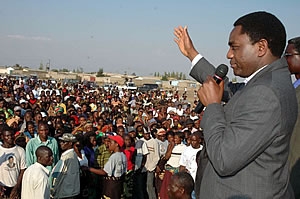Choose Your Language Of Preference Below
French Version German Version Russian Version Spanish Version
Portuguese Version Chinese Version Arabic Version
By Belliah K Theise
 This week ‘s memo is about the next Zambian president. Who should take the Zambian presidential sit in 2011?
This week ‘s memo is about the next Zambian president. Who should take the Zambian presidential sit in 2011?
I hate to admit this, the truth is, our leaders are always voted by villagers, marketeers and street boys who have no clue about education and foreign policies.
According to our observation, most politicians have a way to get into a mind of a person with little knowledge or no knowledge at all. This includes developed countries. If you take a close look on politics, you will find that people end up voting for a candidates who keeps preaching what voters want to hear. People will go out to vote just because of a hear say, without assessing a candidate in practical terms.
In most cases, political Candidates have a tendency to study what the audience want to hear. Any one can stand and say I will give you jobs, bring rich breakfast, lunch and dinner in your home. Zambian Voters will listen because there are no jobs and are in poverty. As a candidate, you are happy when people vote for you. Are you going to keep your promise once you are voted in office?
Practically, things always turns out to be different from all the promises that politicians make.
it’s time for candidates who are aspiring, to start preaching on practical issues and not to give fake hopes to people. Talk about real things that affects the economy of every country, and explain, to voters that it is not an easy path to bring stability to the country, it takes hard work and devotion to make things happen.
Disappointments, comes out when a candidate makes fake promises, do something else after being voted into office. We ask all the aspiring candidates to be more practical in the way they make promises to people, to avoid early disappointments.
It is not fair for voters who have no clue on “Inflation” or economics, who listens innocently and line up to vote for a candidate who later does something contrary to his/her promise.
Zambia has highly experienced ,knowledgeable, and educated people. Why is it that Zambians ends up voting for wrong leaders?
Could it be that all the educated Zambians, are too frustrated with the system, and has opted to sit back and watch, while the poor Zambian villagers , marketeers and street boys take their stand to vote for what they hear from those who can read their minds and give them fake promises? or could it be that qualified leaders and educated Zambians are too busy with other duties and other personal stuff, or they are not brave enough to fight for their people or is it lack of bringing themselves out with a positive approach to their fellow Zambians?
If you are candidate or a voter. It is time to revisit your weaknesses and try to improve on them.
Our advice is:
Avoid: Hate, tribal, gossip, and malicious rumors. By all means, should not be used as a tool to pick a right candidate for president. Validate each rumor, use your own discretion and common sense. Avoid operating like robots that are programed to perform certain functions. Operating like a robot, makes both leaders and their voters look like idiots, when things go sour.
Remember:
Not every rumor or gossip is true. Yes there is no smoke without fire, but you have to remember that humans always enjoy negatives that appear on a candidate without using their good sense of judgement or common sense, they vote basing on those facts. If a negative outweighs a positive side of a candidate, it takes away all the good work he/she has done.
Remember, Media and campaigns are there to help voters to pick the best candidate, but at the same time, uses that as a tool to bring down a candidate, if the opponent has strong links to the media. Many great leaders are brought down in no seconds, and voters end up voting for useless candidates.
Again… use your common sense and your good judgement, when you read negatives that comes flying on potential candidates.
On that note, we decided to re-visit Inonge Mbikusita Lewanika’s profile, as she seem to be carrying all the package of what makes a great president.
We at Zambian Chronicle, would like to see Dr Inonge Mbikusita Lewanika, contest for president in 2011. We have well rounded Zambian candidates like, HH and Many more, Inonge adds to the package.
For years, Zambians have had a problem when it comes to picking a president. It’s time to check where Zambians go wrong when it comes to voting?
Weakness:
We Vote with emotions, tribal, rumors and hate, Worse more when it comes to gender.
In the end we get disappointed with our own voting when things go in a different direction.
May be it is time to turn around, and look seriously inside lives and works of the aspiring candidates, without looking at a tribe, relations, cheap gossips or malicious rumors.
It is even more difficult to convince a Zambian mind, when it comes to women leadership.
When we look at Zambians, we see a lot of potential candidates men and women, that can lead us in 2011, and bring light to Zambia.
I am not here advocating for Inonge because I am a woman.
Here at Zambian Chronicle, we are looking at the credentials, Education and experience.
Zambia needs a candidate for president, that has both local and foreign policy experience. As an African country we can not rule out education. It should be very cardinal in this aspect.
Therefore when it comes to choosing a president, let us open our eyes and pick quality and not quantity.
Inonge Mbikusita Lewanika and Hakainde Hichilema are both quality.
Having said that, Zambian Chronicles will continue to bring out candidates, that we think can make great president for Zambia in the future.
As we pointed out, in our earlier debates, Hakainde Hichilema and Inonge Mbikusita Lewanika, have the real package.
Therefore, without looking at the tribes and gender, we feel Inonge can make a great president for Zambia for 2011. This includes, the appointees of ministers and local government officials.
This forum may help the next Zambian President to pick right candidates for certain roles.
Below is Inonge ‘s profile and credentials:
Copyrights © 2008 Zambian Chronicle. All rights reserved. Zambian Chronicle content may not be stored except for personal, non-commercial use. Republication and redissemination of Zambian Chronicle content is expressly prohibited without the prior written consent of Zambian Chronicle. Zambian Chronicle shall not be liable for any errors, omissions, interruptions or delays in connection with the Zambian Chronicle content or from any damages arising therefrom.
Zambian Chronicle is a wholly owned subsidiary of Microplus Holdings International, Inc.
Copyrights © 2008 Microplus Holdings Int., Inc
Princess Inonge Mbikusita-Lewanika (born 10 July 1943, Senanga) is a senior Zambian politician currently. For more about her check
http://www.inongelewanika.com/family.htm
1. Dr. Inonge Mbikusita-Lewanika is currently Ambassador of the Republic of Zambia to the United States of America . Before her appointment to Washington D.C.
2. She was Ambassador and Special Envoy to the Zambian President during his term as Chairman of the African Union.
3. Dr. Lewanika served as a Member of Parliament in the Zambian Parliament from 1991 to 2001. She was the first Chairperson of the Zambia All Party Women Parliamentarians Caucus and also founding Vice-chairperson of the outhern, Eastern and Horn of Africa African Women Parliamentarian Caucus.
4. At a very critical time just before national elections in 2001, Dr. Lewanika chaired the National Crisis Committee of the Alliance of Opposition Political Parties.
5. She is a former candidate for President of the Republic of Zambia in the December 2001 Elections.
6. She is an Educator by profession and has worked in various levels of Education.
 Prior to her involvement in politics, Dr. Lewanika worked with UNICEF in key leadership roles in Africa overseeing more than twenty countries at a time. Jim Grant, the former head of UNICEF once called her “the most knowledgeable person about the children of Africa .” Dr. Lewanika was among five women from various continents to brief members of the United Nations Security Council on the first and unprecedented debate that resulted in UN Resolution 13 on WOMEN, PEACE and SECURITY in the year 2000. She was among sixteen (16) eminent African Women Members of the Organization of African Unity (now African Union) Committee on Peace and Development, an Advisory Group to the African Union.
Prior to her involvement in politics, Dr. Lewanika worked with UNICEF in key leadership roles in Africa overseeing more than twenty countries at a time. Jim Grant, the former head of UNICEF once called her “the most knowledgeable person about the children of Africa .” Dr. Lewanika was among five women from various continents to brief members of the United Nations Security Council on the first and unprecedented debate that resulted in UN Resolution 13 on WOMEN, PEACE and SECURITY in the year 2000. She was among sixteen (16) eminent African Women Members of the Organization of African Unity (now African Union) Committee on Peace and Development, an Advisory Group to the African Union.
She was President of Federation of African Women’s Peace Networks (FERFAP) from 1997 to 2002. As President of the Federation of African Women Peace Networks (FEFAP) she contributed to mobilization of peace activities. In that capacity, she was selected to be among ten prominent African Women Peace Workers that visited Rwanda soon after the genocide. She later led a United Nations delegation to Burundi and Rwanda to assess the effects of the genocide on women and children and recommend intervention strategies. She led the Electoral Institute of Southern Africa (EISA) Observer Mission of 96 Southern African
Academicians, Researchers and Members of Civil Society to the Zimbabwean Presidential, Mayoral and Council Elections in 2002. She was one of the International Youth Foundation’s founding board members.
Dr. Lewanika holds a Ph.D. in Early Childhood and Primary Education from New York University . She is a mother of two grown daughters, a grandmother to four boys and a grand daughter. She has lived in five countries and speaks eight languages.
——————————–
A look at more of Inonge Mbikusita Lewanika’s work Below:
| By Lori Nitschke WeNews correspondent |
| After 30 years of promoting girls’ education in the less-developed world, aid workers are now realizing that it is not enough to simply open the school door to girls. Unemployment, clean water and HIV/AIDS are now also on their agenda. |
 WASHINGTON (WOMENSENEWS)–Like many aid workers and activists trying to improve the lives of women in developing countries, Inonge Mbikusita-Lewanika has long viewed education as the key to solving many of her countrywomen’s problems.Mbikusita-Lewanika, a former member of Zambia’s parliament and now the country’s ambassador to the United States, says the benefits of educating girls are so numerous– from raising marrying ages and lowering birth rates to stemming health and economic problems–that she would like to install a plaque reading “Send the Girls to School” in every village.But 30 years after the U.S. government and other aid-givers began to promote gender equality in their programs, they, like Mbikusita-Lewanika, have learned that relieving the burdens of poor women is more complex than once thought. Foreign aid officials from the United States, United Kingdom, United Nations and various nongovernmental organizations say that it is not enough to open the school door to girls if their families are besieged by unemployment, unclean water, labor-intensive household chores and, increasingly, debilitating health problems such as HIV/AIDS. Nor is it enough to get a few women elected to the parliament or congress while women in the countryside still suffer age-old discriminations.To succeed, say aid experts, gender-equality programs must be integrally incorporated into the aid process from top to bottom, beginning with constant attention to gender issues at the policy level and ending with a wide distribution of burden-relieving aid in the rural areas where discrimination is often most ingrained.In Africa, for instance, women perform about 75 percent of agricultural work, according to Mark Blackden, the lead economist in the World Bank’s Poverty Reduction and Management of Gender Equity Division. He estimates the continent’s per-capita income would have doubled over the last 30 years if women had been given more aid and education to help with crop production. But aid givers have only recently realized that “one does indeed need to talk about the African farmer and her husband,” Blackden said.Instead, because of cultural misunderstandings, they have often directed agricultural education and technology to men. As a result, Mbikusita-Lewanika said, it is not uncommon to see men sitting on tractors as women and girls continue to cultivate with a hand hoe nearby.Clearing a small plot of land in this manner can involve 18-hour days, leaving women little time to raise their children, gather fire wood, walk long distances to find potable water and, increasingly, care for the sick. With such intensive household labor needs, Mbikusita-Lewanika said girls often have little time for school.”The average woman takes care of everyone else but herself,” Mbikusita-Lewanika said at a recent Capitol Hill briefing for legislative staff.In countries where economies have been destroyed by conflict or AIDS, another factor diminishes the rationale for education: The lack of jobs when a girl graduates. As a result, Mbikusita-Lewanika said that, while education “may be the most important investment, it may not necessarily be the first investment” that donors should undertake. For instance, providing drinking water would save women in many Zambian villages 1 1/2 hours a day, she said.In 1973, the U.S. Congress passed the Percy Amendment requiring that the nation’s foreign aid help integrate women into the mainstream of developing countries’ societies. Since then, the U.S. Agency for International Development–the main administrator of U.S. development aid–and other organizations have progressed from conducting a few gender equality projects a year to considering gender issues as a part of nearly every decision. While women’s issues once were often segregated in a separate office or set of discussions, all programs are now expected to address their impact on women.”The progress can be summed up in one sentence: It is no longer a separate thing,” USAID administrator Andrew S. Natsios told a Washington foreign aid conference earlier this month. WASHINGTON (WOMENSENEWS)–Like many aid workers and activists trying to improve the lives of women in developing countries, Inonge Mbikusita-Lewanika has long viewed education as the key to solving many of her countrywomen’s problems.Mbikusita-Lewanika, a former member of Zambia’s parliament and now the country’s ambassador to the United States, says the benefits of educating girls are so numerous– from raising marrying ages and lowering birth rates to stemming health and economic problems–that she would like to install a plaque reading “Send the Girls to School” in every village.But 30 years after the U.S. government and other aid-givers began to promote gender equality in their programs, they, like Mbikusita-Lewanika, have learned that relieving the burdens of poor women is more complex than once thought. Foreign aid officials from the United States, United Kingdom, United Nations and various nongovernmental organizations say that it is not enough to open the school door to girls if their families are besieged by unemployment, unclean water, labor-intensive household chores and, increasingly, debilitating health problems such as HIV/AIDS. Nor is it enough to get a few women elected to the parliament or congress while women in the countryside still suffer age-old discriminations.To succeed, say aid experts, gender-equality programs must be integrally incorporated into the aid process from top to bottom, beginning with constant attention to gender issues at the policy level and ending with a wide distribution of burden-relieving aid in the rural areas where discrimination is often most ingrained.In Africa, for instance, women perform about 75 percent of agricultural work, according to Mark Blackden, the lead economist in the World Bank’s Poverty Reduction and Management of Gender Equity Division. He estimates the continent’s per-capita income would have doubled over the last 30 years if women had been given more aid and education to help with crop production. But aid givers have only recently realized that “one does indeed need to talk about the African farmer and her husband,” Blackden said.Instead, because of cultural misunderstandings, they have often directed agricultural education and technology to men. As a result, Mbikusita-Lewanika said, it is not uncommon to see men sitting on tractors as women and girls continue to cultivate with a hand hoe nearby.Clearing a small plot of land in this manner can involve 18-hour days, leaving women little time to raise their children, gather fire wood, walk long distances to find potable water and, increasingly, care for the sick. With such intensive household labor needs, Mbikusita-Lewanika said girls often have little time for school.”The average woman takes care of everyone else but herself,” Mbikusita-Lewanika said at a recent Capitol Hill briefing for legislative staff.In countries where economies have been destroyed by conflict or AIDS, another factor diminishes the rationale for education: The lack of jobs when a girl graduates. As a result, Mbikusita-Lewanika said that, while education “may be the most important investment, it may not necessarily be the first investment” that donors should undertake. For instance, providing drinking water would save women in many Zambian villages 1 1/2 hours a day, she said.In 1973, the U.S. Congress passed the Percy Amendment requiring that the nation’s foreign aid help integrate women into the mainstream of developing countries’ societies. Since then, the U.S. Agency for International Development–the main administrator of U.S. development aid–and other organizations have progressed from conducting a few gender equality projects a year to considering gender issues as a part of nearly every decision. While women’s issues once were often segregated in a separate office or set of discussions, all programs are now expected to address their impact on women.”The progress can be summed up in one sentence: It is no longer a separate thing,” USAID administrator Andrew S. Natsios told a Washington foreign aid conference earlier this month.
More Work to Be DoneStill, aid officials and activists say there is much more to do. According to the World Bank, more than 20 percent of the world’s population still lives on about $1 per day. The majority are women. And women’s burdens, especially in AIDS-stricken Africa, are growing as they bear bigger social and financial burdens. One way donors can begin to lift that burden, Mbikusita-Lewanika told legislative staff, is to bypass governments and distribute aid money to local faith-based organizations and other groups that work at the local level and already know the intricate problems the women in their community face. Many central governments have not established effective ways to distribute help in the countryside, she said. Other officials suggest increasing funding to fight HIV/AIDS in Africa. The $2 billion the Bush administration is prepared to spend in 2004 “is not enough,” said Kathryn Wolford, president of Lutheran World Relief, based in Baltimore. Wolford also suggests an increased focus on debt relief for poor countries, which would free funds for social programs and infrastructure that could relieve women’s burdens. Other activists say aid organizations need to collect and process more data showing the positive link between women’s participation and economic development. While many activists suggest that there is already too much talk about women’s problems and not enough action to solve them, economists say that more convincing evidence of the link between women’s progress and economic progress could be found. At the foreign aid conference, Phil Evans, the senior social development adviser for the United Kingdom’s U.N. mission, said that statistical gender analyses are often riddled with “methodological problems,” in large part because researchers have focused on studying women instead of placing them in a societal context. Some say the United States should signal its commitment to gender equality by ratifying the Convention on the Elimination of All Forms of Discrimination Against Women, an international treaty that aims to outlaw discrimination against women and requires signatory countries to periodically report on their progress. President Carter signed the treaty in 1980 but the U.S. Senate has not ratified it as 174 nations have done. Ratifying the treaty would send a powerful signal that the United States will join the world to “use the instruments available to us to hold countries accountable” for improving women’s lives, Geeta Rao Gupta, president of the Washington-based International Center for Research on Women, told legislative staff. New Solutions in AfghanistanIn Afghanistan, USAID is attempting to deal with these challenges and its methods are not always very subtle. To encourage families to educate their daughters, USAID gives extra rations of vegetable oil to girls who attend school every day for a month, Natsios said. The number of girls attending school has increased overall from 6 percent to 35 percent, Natsios said, and is reaching 50 percent in some towns. Not all of USAID’s work in Afghanistan is so targeted at women and girls but Natsios said he has found that nearly every project is having an impact on women’s status. For instance, the U.S. program that is building a 300-mile road from Kandahar to Kabul is unexpectedly improving women’s health in southern Afghanistan. Now mothers in childbirth and women in other forms of medical distress can be driven to medical facilities in Kabul in a matter of five to six hours. Before the road was built, the trip could take two days, Natsios said. In addition, USAID has installed day-care centers in all Afghan government ministry buildings. Natsios said women who work for the ministries–many now widows with young children–said they would not return to their jobs unless their children had a safe place to go. While many activists and government officials say gender issues are no longer seen as women’s alone, they hope the next 30 years will bring a greater resolution to age-old problems. “It has taken a very long time to get as far as we are and (we) have a very long road to go,” said Julia Taft, assistant administrator and director of the United Nation’s Bureau for Crisis Prevention and Recovery. Lori Nitschke is a freelance journalist living in Washington, D.C. She was recently a Knight-Bagehot fellow at Columbia University in New York, where she received master’s degrees in journalism and business administration. Previously, she covered economic issues for Congressional Quarterly. |
Copyrights © 2008 Zambian Chronicle. All rights reserved. Zambian Chronicle content may not be stored except for personal, non-commercial use. Republication and redissemination of Zambian Chronicle content is expressly prohibited without the prior written consent of Zambian Chronicle. Zambian Chronicle shall not be liable for any errors, omissions, interruptions or delays in connection with the Zambian Chronicle content or from any damages arising therefrom.
Zambian Chronicle is a wholly owned subsidiary of Microplus Holdings International, Inc.
Copyrights © 2008 Microplus Holdings Int., Inc





 President Clinton appended his autograph to the State House guest book and had over an hour closed-door meeting with HE Levy P Mwanawasa, SC.
President Clinton appended his autograph to the State House guest book and had over an hour closed-door meeting with HE Levy P Mwanawasa, SC. 




